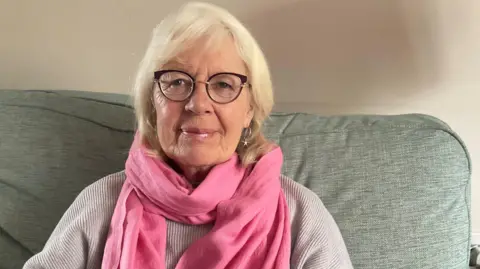PIP benefit changes: 'I want to keep my dignity'
 Karen Langford
Karen LangfordThe government is considering major changes to the disability-benefits system.
In plans announced on Monday, it said reforms to personal independence payments (PIP) could include stopping regular cash payments and instead offering claimants one-off grants for things such as home adaptations.
It says spending on PIP - a benefit for those who work as well as those who do not - is expected to grow by 52% from 2023-24, to £32.8bn by 2027-28, driven in part by a rise in claimants with mental-health conditions.
Work and Pensions Secretary Mel Stride said the reforms were "significant in their scale and their ambition" and aimed to “modernise the support provided through the benefits system”.
"We owe that to the millions of people who rely upon it and to the hard-working people whose taxes underpin it," he said.
Prime Minister Rishi Sunak added the plans would make the benefits system "fairer to the taxpayer, better targeted to individual needs and harder to exploit".
Hundreds of people who would be affected by the plans have contacted BBC News.
'I don't want to be a burden on my family'
Karen Langford, 71, from Somerset, was diagnosed with rheumatoid arthritis eight years ago.
All her major joints become inflamed and extremely painful.
And then, she needs more help to manage daily life.
“When I get a flare-up, I feel like I have flu," Mrs Langford says.
"I can’t walk, use my hands or do basic tasks like personal care or house work."
Mrs Langford says she was advised to apply for PIP a year after her diagnosis.
The application involved her completing a written form and an in-person assessment with a nurse.
Mrs Langford qualified for the basic rate of PIP, about £65 per week, which she says she spends on reflexology treatment and help with cleaning and other household tasks when needed.
It also helps with hospital parking charges and journeys to the pharmacy to collect her medication.
“This isn't about me going for a day at the beach and buying everyone an ice cream," Mrs Langford says.
"It’s about me maintaining independence, not being a burden on my family and keeping my dignity.
"PIP has enhanced my quality of life.
"It means I don’t have to struggle and I don’t have to constantly ask for help from my busy family."
Mrs Langford says her condition has gradually deteriorated over the years.
And on some days in the past 18 months, she has been unable get out of bed.
"The government is completely out of touch with people who have chronic illnesses, like me, and how we exist on a daily basis," Mrs Langford says.
"Why pick on people like us, who will be really impacted if they stop this benefit?
"I have worked hard and never claimed anything before."
'PIP would be a massive help for me'
 Sam Webster
Sam WebsterWhen Sam Webster was diagnosed as autistic, aged 14, he was told he might not be able to live independently as an adult, have a career or a relationship.
But 20 years later, he works full time as a creative designer and lives in Wiltshire with his wife and children.
He says his employer is very inclusive and supportive - but Mr Webster has recently applied for PIP, to help with expenses related to his health conditions, which include anxiety.
“I would use PIP to put in air conditioning as temperature is a stimuli for my autism," he says.
"Blue-light monitors would also help with light sensitivity.
"And although my employer has now agreed to pay for some noise-cancelling headphones for me, I would like to have been able to get these for myself ages ago.
Sam does not drive because he has problems with depth perception and physical co-ordination, so he has to use public transport.
He says PIP would be a "massive help" as it would allow him to get discounted train tickets, as he would become eligible for a Disabled Persons Railcard.
The application process, involving a phone call with a stranger and an in-person assessment, is difficult for autistic people, Mr Webster says.
“It’s almost designed to be as difficult as possible, to put off as many people as possible, to pay out as little as possible," he says.
And now he has got this far in the process, it is "very frustrating to hear the whole system may now be about to change".
'I'm not lazy, I'm poorly'
 Vicky
VickyVicky, 35, from Stoke, who asked that her surname be withheld, has been claiming £283 a month in PIP for the past six months.
Although PIP is not an out-of-work benefit - so those with a job can still be eligible - she applied after stopping working night shifts as a warehouse operative.
Vicky, whose conditions include bipolar and post-traumatic stress disorders, says the idea of changing the current system was worrying.
"It's scary enough having to deal with the mental-health teams I deal with on a daily basis, without having to think that I'd have to interact with even more professionals... when I struggle on a daily basis to even get out of the door," she says.
“PIP is supposed to alleviate some pressure, not increase it.
“I'm not lazy or stupid, I'm poorly and already doing everything I can to help get myself into a better place, working with mental-health teams and a community psychiatric nurse, without the added pressure of what the government is proposing."
Additional reporting by Alice Evans and Kris Bramwell.
